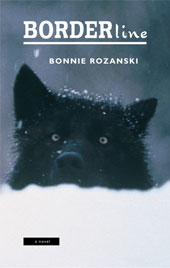The Porcupine's Quill
Celebrating forty years on the Main Street
of Erin Village, Wellington County
BOOKS IN PRINT
Borderline by Bonnie Rozanski
Borderline is a skewed coming-of-age story of a normal boy in a crazy world -- a fast-paced world of high-tech gismos, global air travel and antibiotics, a world in which high schools have replaced cafeterias with fast food counters and the scourges of autism, asthma, allergies, diabetes and obesity are the norm.
Still another novel about adolescent angst? Well, the protagonist is indeed going on thirteen and, with some justification, he is seriously stressed, but there this wonderful story diverges from the stereotype. Rampant hormones, peer pressure, romance -- all take a backseat as Guy Ritter wrestles with the challenge of attracting the attention of parents preoccupied with the demands of his autistic brother. And then there is the wolf, condemned to euthanasia unless Guy can find a way to spring him from a pen.
Adolescents will love this book, but there is much here for adult readers as well, including a short treatise on genetics and a graphic evocation of the consequences of a fast-food diet.
All of the characters in this story are interesting and believable: Guy’s mother, driven to distraction by the needs of her autistic son; his father, the geneticist, preoccupied with his experiments with wolves; a most unorthodox psychiatrist patiently seeking a breakthrough with a stubbornly unresponsive patient. And the most fascinating of all, Austin, who, at the age of five cannot speak but can take apart and re-assemble any electronic gadget, including the lock on a wolf’s cage.
Bonnie Rozanski has obviously done extensive research on genetics and on autism, and the novel offers a short treatise on each, but the enlightenment in no way detracts from the fast-moving plot and the engaging insights into the minds of pubescent boys. This novel will appeal to readers from twelve to ... well, whenever, if ever, the need to learn and to enjoy ceases.

2008—ForeWord Magazine Book of the Year,
Shortlisted

2008—Independent Publisher (IPPY) awards,
Runner-up
Picture Holden Caulfield in 2004: smart but unfocussed, energetic but restless; creative but disorganized, with a smutty mouth. He’s mostly unmotivated, really screwing up at school. He detests his autistic younger brother Austin. With his mother obsessed with caring for Austin, and his scientist father immersed in his research, Guy, the twelve-year-old Everyman his name implies, is ignored. ‘I might as well be the Guy in the moon for all they care,’ he observes.
‘Okay, class,’ Guy’s teacher instructs. ‘All the children who need to see the nurse for Insulin, Ritalin, Flovent, Vanceril, please go now.’ Guy, narrating, comments, ‘Thirteen kids stand up: fat, skinny, hyperactive, asthmatic, all the kids who would maybe die if they didn’t get their meds, and all of them rush out the door to the hallway.’
Guy’s best friend is Matt: ‘five inches shorter than I am and maybe thirty pounds heavier, with hair like a poodle,’ friends ‘since we were three years old, when our mothers both dumped us off at this pre-school program at the Y, and neither of us knew what the hell was coming off.’ Together, Matt and Guy face the world. At school, there is Sergeant Cassidy the security guard, armed with a stun gun to head off any potential Colombine-in-the-making, and the dreaded Mrs Tartaglia. At Guy’s home, there is the little brother who absorbs every bit of his parent’s attention, and at Matt’s, whose mother left three years ago, there is Matt’s father, jolly and rich, who can’t seem to stop eating.
Meanwhile, Guy’s father seeks to replicate the evolution of the dog from their forebears, wolves, by breeding the tamest wolves to the tamest wolves, generation after generation. To his surprise, after a mere dozen generations, the wolves begin not only to bark like dogs, but to look like dogs, with curly tails and floppy ears. These changes are too rapid to be genetic, Guy’s father insists. ‘We’ve changed our own environment, and now it’s changing us.’
Guy bonds with JX104, a wolf-dog in his father’s dog lab. Wolf, as Guy renames him, is one of the dogs who falls between the cracks. He never does became tame enough to breed, and as a final straw, half-chews someone’s hand off. Guy’s father says they’re going to have to put him down. Guy yells, ‘He’s not gonna be this perfect yuppy dog. That’s not who Wolf is, and it’s not fair killing someone just because he can’t be what you want him to be.’
But it’s no use. Guy and Matt decide to break Wolf out that night, and to return him to the wilderness. Guy is able to steal a key card to get into the lab, but he can’t open the lock to the dog’s cage, so they are forced to bring along his brother Austin, a savant at taking things apart. They plan on first returning Austin home, but as they turn onto his street, they find the house ablaze with lights. In the end, three boys and one wolf take a ride in a stolen SUV back to the wilderness.
Review quote
‘Borderline is a book that works on so many levels that it is almost unclassifiable. It is a genuinely warm, tender, humorous coming of age story while at the same time being a novel that is smart, informative and illuminating in the fields of genetics, autism as an increasingly proliferating condition, fast food and obesity as national crises, and the overemphasis of pill-popping for invented childhood and adult disorders. Sounds like too much information to compress into one book? Not in the deft hands of author Bonnie Rozanski! For all of the intelligent and interesting information the book contains, the story itself is an amazingly fresh novel, written with great style and sensitivity, a novel than will appeal to just about everyone no matter the age group.’
—Grady Harp
Review quote
‘Bonnie displays a pure grasp of the way kids talk, the veering from cutting remarks to astounded joy, the relentless pursuit of stimulation and impatience with anything they find ‘‘stupid.’’ Which are most things, and people. The way they share secrets, make unspoken treaties, and how when things get really tough, they find out, for better or worse, who can be depended on, and learn to forgive, and to let go. There is, familiar to all, an adolescent’s near-constant state of embarrassment at having to breathe the same air as their parents. And conversely, there’s the competition for affection and attention within a family, and not just with the kids, as individual’s needs push and pull them toward and away from each other, of course in the case of Guy’s family, exacerbated by his little brother’s autism. Much of the emotional punch of this book comes from experiencing along with Guy and his mom and dad the ebb and flow of their relating to Austin, their autistic son.’
—Glenn, goodreads.com
Review quote
‘A brilliant coming-of-age story, Borderline portrays an overwhelmed older brother, an over-ignored son, and a determined caregiver in the form of Guy Ritter. And as if a teacher who has it out for you, a best friend who won’t stop eating and a temperamental semi-girlfriend isn’t enough, Guy’s also been dealing with his ‘‘austinistic’’ brother for way too long. And all that bulk has a lot of stress piggy-backed onto it. What can a thirteen-year-old kid do when his best friend’s father’s fast food feasting becomes perilous? And what will the utterly impulsive Guy do when he comes across the majestic experiment animal that soon becomes his best friend? And what about his brother’s controversial treatment? And most of all, can one child really deal with all that?’
—L Spro, flamingnet.com
Review quote
‘Bonnie Rozanski’s Borderline reminds me of Rules by Cynthia Lord which was a Newberry Honor Book. Both deal with a teen whose sibling is autistic. Both do an excellent job of portraying the anguish and anger the normal sibling experiences as well as how the experience sharpens their insights into what emotions and coping mechanisms drive others.
‘Borderline explores new, edgier territory and does it excellently. I read it in less than three hours and found myself immersed and totally engaged. Rozanski weaves dietary, health and hereditary issues seamlessly into the story, creating a literary ride that will easily engage both teens and adults. It is a great book for both public and school libraries as well as for anyone who likes a well-written and fast-paced story about families dealing with difficult issues.’
—John R. Clark, TCM Reviews
Author comments
For some time I had been interested in reports that obesity, attention deficit disorder and autism were all becoming more prevalent. Autism, in particular, seemed to be suspicious. This was the initial inspiration for Borderline. Assuming that human beings’ genetic make-up remains essentially unchanged, then surely the environment must be complicit. Or is it?
Then I watched a documentary on the evolution of the dog. Dmitry Belyaev, a 20th century Russian scientist, conducted ingenious studies in which wild foxes were bred over generations. Over time, Belyaev, attempting to replicate the evolution of the dog from the wolf, bred the tamest foxes to the tamest foxes. Amazingly, in only ten to twelve generations, the foxes began not only behaving like dogs but looking like dogs, with floppy ears and curly tails. Clearly, this could not be explained by genetics alone: ten generations of foxes simply is not time enough for a species to evolve.
It appeared, as I read further, that Belyaev’s results were due to epigenetics: those influences of the genes but beyond the genes. These can include turning gene expression on or off, RNA, regulator genes, and gene-environment interaction. The whole topic fascinated me. We are transforming our own environment and unknowingly changing ourselves in the process. I began to wonder about how to embed all this in a plot, and imagined a family obsessed with curing their autistic son; a desperate mother, a scientist father and an older brother who feels ignored; all set in our present-day world of shopping malls and antibiotics, global air travel, and high tech gismos.
—Bonnie Rozanski
Bonnie Rozanski currently resides in New Jersey, but has lived all over the United States and Canada. She has degrees from the University of Pennsylvania, Adelphi University (Garden City, Long Island) and the University of Guelph, and worked in both academia and business before deciding to return to her first love, writing. She has written several books in which scientific issues inform the plots, as well as two prize-winning plays.
The Porcupine's Quill would like to acknowledge the support of the Ontario Arts Council and the Canada Council for the Arts for our publishing program. The financial support of the Government of Canada through the Canada Book Fund (CBF) is also gratefully acknowledged.





